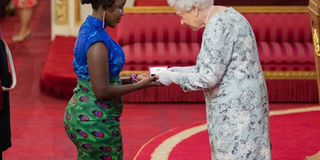Nabembezi’s App has helped youth in Africa

Awarded. Ruth Nabembezi is recognised by the Queen of England in 2017 for her role in promoting sexual health. COURTESY PHOTO
What you need to know:
- Inspiration. Following the loss of her family to Aids, Ruth Nabembezi embarked on a journey of improving dissemination of information on sexual health, writes Nicolas Akasula.
The HIV rate in Uganda is currently at 7.5 per cent, whilst unwanted and teenage pregnancies are prevalent. And the commonest solution offered by leaders, elders and in schools is the sermon of abstinence from sexual encounters, which mostly work for a handful.
This is perhaps why many people like Ruth Nabembezi are bound to rise in desire to create awareness.
When the phrase ‘ask without shame’ slips through for the first time, it’s most probable that what comes to the mind is a tale of unserious friendship somewhere sowing dubious seeds of shamelessness.
However, that’s not the case. In this context, it’s a ground breaking lifesaving phenomenon.
Nabembezi, whose parents died of Aids while she was only four, faced the bummer of ignorance on the side of the people she was living with.
She lost her elder and only sister to Aids out of ignorance, an experience she does not enjoy to tell.
“I knew she had HIV because I had seen hospital records stating that she was positive. And I also equally knew about our dad and all the women he had, since he was a soldier and had wives anywhere and everywhere,” she recounts.
Her sister, Pamela, who was seven years older than her, had given birth to children who died while they were still infants. (The mortality rate for HIV-infected babies in Uganda is six times higher than uninfected children).
She often developed severe skin rashes, became too thin, and lost hair. But their neighbours argued that she was possessed by demons, and thus took her to a witchdoctor for treatment (cleansing).
Eventually, she died, though she could have been saved if she had access to accurate information / guidance and professional medical treatment.
Nabembezi recalls how on the unfortunate day she got called from school to home, and found that Pamela had passed away. She died aged of 23. Later when she returned to school, still grieving for her sister, she started to think more deeply about how the lack of awareness robbed her of her sister.
“I started talking to some friends about HIV, but it wasn’t so useful because at that moment I couldn’t talk about what happened back home,” she says. “People discriminate you and isolate you when you talk about HIV. That’s why even up to now I don’t like talking about my story.”
Nabembezi was sent to an orphanage in Mpigi, from where she got sponsorship to attend secondary school.
She often hopped between boarding school and her uncle’s house, before later joining Mulago Paramedical School where she started thinking of breaking shame and superstitions surrounding sexuality and HIV/Aids.
Out of her exceeding frustration that people in Uganda are not having the right information in regards to sexual health and are also not even comfortable speaking about it, she started working on the idea of a sex education mobile application, and the text service platform in.
And when she joined the Social Innovation Academy shortly after Mulago Paramedical School, she created the Ask Without Shame app; as a place where sexual health questions are answered by doctors, nurses and counsellors without judgment or shame. The app was launched in December 2015.
But as a blessing in disguise, what seemed to be fate in the beginning, has transformed Nabembezi into a strong leader, inspiring other youth, especially girls, with her story.
And as if that’s not all, she has been able to offer along employment opportunities with the social enterprise so far employing 12 professional youth (with university degrees).
It has responded to more than 80,000 questions of more than 60,000 users, mostly from Uganda and other African countries. It offers free sex education to youth from the age of 12 to 35 years, and all questions are anonymous and confidential, save for WhatsApp users.
Callers use the toll free number, 0800-20-30-63, which is available weekdays (with Saturday inclusive) at working hours, save for Sundays and when there are technicalities from the developer.
The services could be questions about HIV or other STDs, menstruation, masturbation, unwanted pregnancies, etc.
Justine Namubiru, a counsellor at ABII clinic in Wandegeya, Kampala, says the app is a great initiative. However, it has its pros and cons.
“It is great to have such a counselling platform since it saves time and money. However, when we are counselling, in some cases that could be extreme, you would want to physically see the client, for instance, when the presented case pertains violence,” she says.
Hence this leaves a gap for homework on whether Skype or other video call fora will be incorporated into the system.
Nabembezi states that when the evidence about this is witnessed in session, it gives more accurate guidance, although she leans in support of the app.
Nabembezi wants more and the sky is not even the limit!
She says that she wishes to see the app, which has won her several international accolades with the most outstanding being the Queen’s Young Leaders Award that was presented to her in June 2017 by Her Majesty the Queen of England, reach every country of the world.
About App
It has responded to more than 80,000 questions of more than 60,000 users, mostly from Uganda and other African countries. It offers free sex education to youth from the age of 12 to 35 years, and all questions are anonymous and confidential, save for WhatsApp users.




